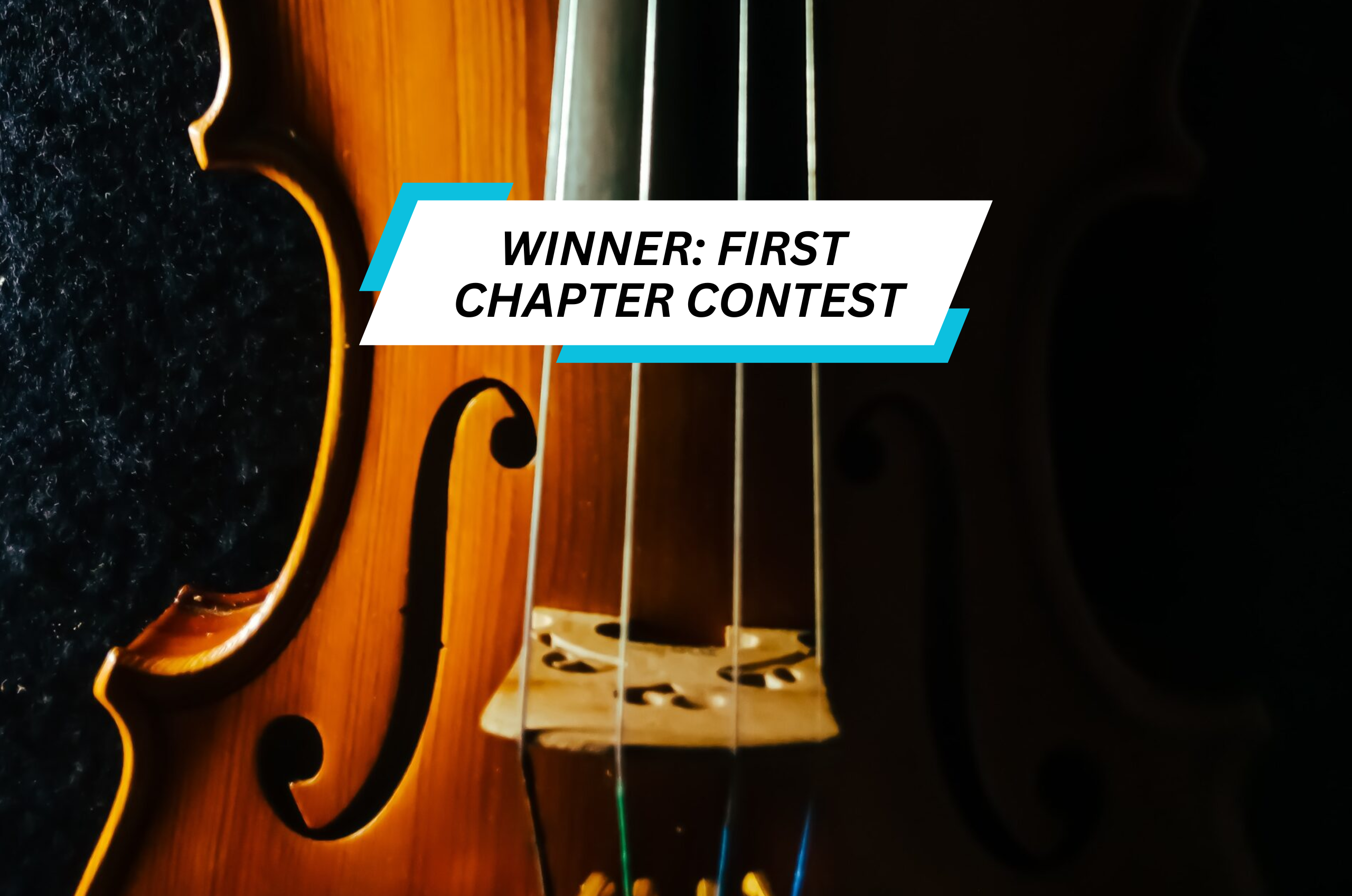1
“It sounds like cats dying.”
She said it in the glum tone of a child only just now being introduced to the disappointments life had in store. Mark Provaunce felt a twinge in his chest at the sound of it, thinking for the third time that morning of how his little girl was not so little anymore.
“And how would you know what a dying cat sounds like?” he asked her, a smile coming easily to his lips. She showed him her tongue and took the violin back up under her chin. Mark winced as she drew her bow across its strings. It really did sound like a dying animal.
“It’s terrible, Dad. I hate it.”
“Well, Sof, maybe you should spend more time watching lessons and less time looking at dead cat videos.”
She huffed, lowering the instrument and stomping her feet on the faded carpet of the music store. “It’s not me, it’s this stupid violin! It’s a cheap piece of junk.” She plopped it unceremoniously back onto one of the U-shaped hangers which lined the wall and took a step back, eyeing the display before her with big eyes and a determined mind. Mark stood behind and watched, already nervous about what his daughter’s wishes would mean for his wallet. Along with her burgeoning sense of cynicism, it seemed Sofie had also been gifted with an acute taste for the finer things in life in the weeks leading up to her eleventh birthday.
On cue, Sofie leapt forward to snatch the polished, delicately curved neck of a violin and pulled it eagerly from off the wall. “This one,” she said in a rush, spinning on her heel to hold up the instrument to her father. “Listen!”
The sound was smoother, though still sharp and rough at its edges, as Sofie worked the strings of this new violin with her bow. Mark marveled at the intricate shapes made by her slender fingers and the sounds they produced. It was a talent she certainly had not inherited from him — she could thank her father for the budding cynicism, though — and while Sofie was still very much a novice, the promise of what would soon be was clear to Mark as he listened to his daughter play. He laid a hand on her shoulder. Sofie flashed him a toothy grin.
“Sounds great,” came a voice from behind. Mark turned to see a windburnt face perched above a wiry body dawdling up to them. The man who wore it was at least ten years Mark’s senior but wore the perennial outfit of the youthful misfit: faded jeans, black T-shirt, and Converse Chucks. What hair was left had been pulled back into a sad, stringy ponytail, and his arms, thin, reedy things, were a tapestry of fading tattoos that dangled like threads from the dark holes of his tee. He wore round frame glasses pushed to the absolute tip of his hooked nose, a subtle personal rebellion against his own fading eyesight. It was as if this man had been spawned by the music shop itself, for to imagine him in any other setting seemed to Mark like picturing a sloth at the Kentucky Derby.
“That’s the one for you, I’d wager,” said the man. His voice had a pleasant timbre.
Sofie shared her smile with him. “Thank you. I love it, too!”
“The instrument picks the musician. Have you ever heard that?”
“Ya-huh,” chirped Sofie. Mark, meanwhile, had the suspicion that only the most expensive instruments were so promiscuous in this particular music shop. He reached down and cupped the price tag dangling from the violin’s neck in his palm, turned it upright, then flinched as if it had bitten him.
“This is eight hundred dollars?!” he asked, more as a reflex than curiosity.
“Well,” said the man, who Mark now pegged as the pushiest of sales types, wrinkled T-shirt be damned, “it’s a truly beautiful violin. It’s not just the sound but the craftsmanship. An instrument like this is one that you grow with. For folks who are serious about their art. And I can tell you’re the serious musician type, aren’t ya, little lady?” He grinned a thin weasel grin at Sofie, who, despite all the new milestones of maturity, had not yet learned the telltale signs of false sincerity and so smiled right back.
“Yes, I practice all the time,” she said. Sofie turned to look up at her father, eyes wide and pleading. Now that’s a trick she has mastered, thought Mark. “Can we get it, Dad?” she begged. “Oh, it’s just perfect.”
“It’s eight hundred dollars, Sofie.”
The clerk slid between them, hands upturned and out to receive the violin. Sofie handed it over, rather reluctantly. He accepted it with a curt nod and held it up, seemingly so Mark could get a better view of it. “Do you know what makes a good violin?” asked the clerk, peering over those little glasses of his.
“Is it tied to the price of the violin?” quipped Mark, unable to control his rising brow.
The clerk chuckled. Like his voice, the sound was pleasant, round, almost musical. “It often is,” he answered. “But not as a rule.” He tapped a painted fingernail against the head of the instrument. “It’s the scroll. You can tell a lot about the craftsmanship of a violin by the shape and quality of its scroll, and this one…,” he let out an exaggerated whistle, “is a beauty.”
“It really is, Dad. And it sounds so much better than the other one.” Sofie scooted nearer, taking hold of Mark’s arm. Impossibly, her eyes went a dial wider, and, to seal the deal, she stuck out her bottom lip in her most practiced pout. “Can we please get this one, Dad? Please.”
The smug smirk creeping along the clerk’s lips did not escape Mark. The son of a bitch had him now. “Alright, Sof,” he sighed, defeated. “But I better see you practicing that thing every single day.”
Sofie leapt back and clapped her hands together excitedly. “Oh, thank you, Daddy! Thank you! I will, I promise!”
The clerk wore a mask of deep satisfaction, his hunt successful. “Great choice,” he said. “You will cherish this instrument for years, I am telling you. And I’ll even throw in a case and a bow for you.” He performed a solemn bow, as if this were some act of great kindness. Mark rolled his eyes. “I’ll get you all rung up,” said the clerk, shuffling off to the counter and leaving Mark to contemplate just how quickly this day had turned against him.
The look on Sofie’s face lessened the blow. Mark was the hero, at least for the moment, and he promised himself to never lose the image of love he now saw in his daughter’s eyes. If even a fraction of that remained throughout her life, Mark would never want for more. If love that strong needed to be bought, eight hundred dollars was a bargain.
Mark led his daughter to the register, where the clerk had packaged the violin neatly into a velvet-lined case alongside the bow. He was tapping away at a register that looked older than the stained carpets upon which they stood. Behind him was a row of tall shelves cluttered with various musical accessories. Mark scanned them passively as the clerk rambled on, tallying up their total and looking to squeeze whatever stray dimes he could from this sale.
“Now, I’d recommend adding a protection plan for this type of instrument, nice as it is, which will cover any damage or …,” Mark nodded along as he drummed his fingers against the counter and looked at the items strewn across the shelves. Guitar necks, bundles of chords, shakers, and tambourines, and other such noisemakers that Mark could not put a name to. His gaze slipped over them all, uninterested, until something snagged his eye and yanked it back.
It was the head of a violin. A scroll, as the clerk named it.
There was nothing in particular about it that should have held Mark’s attention. It was a dull piece of wood, shaped into a curve and flaking around its edges. It did not sport the polished sheen of the instrument his daughter had picked out, nor was it ornately carved or decorated. Yet, when he looked at it, Mark felt a tug. There was a desire to run his hand across its rough surface, to feel its curves beneath his palm.
To hold it.
“What’s that?” Mark found himself asking, pointing towards the box from which the scroll peeked its head.
“Hmm?” said the clerk, still pressing tabs on the register. He turned, following Mark’s outstretched finger. “Oh, those are just old, broken bits.” He gave a dismissive shake of his head and brought his attention back to Mark. “Would you like to add the protection plan? It really is a great value, and you never know —”
“No,” said Mark, interrupting. “The instrument there. The violin.”
Sofie reached lovingly for the violin in the case. “Daddy, I want this one.” Mark touched his daughter with an idle hand, but his eyes would not leave the shelf. “I’d like to see it,” he told the clerk.
The man blinked behind his round glasses. “You wouldn’t be interested in anything up there,” he said. “It’s mostly just random pieces that we gathered together over the years. Almost nothing up there is even intact.”
“I’d like to see it,” Mark repeated.
The clerk paused. He looked to Sofie, but Mark flicked an urgent finger at the box. With a shrug, the clerk turned to retrieve it, shuffling across the carpet on his Chucks. He returned a moment later with the box, which he placed upon the counter between them. It was, indeed, filled to the brim with stray bits of broken instruments and musical paraphernalia. Mark ignored it all, focused only on the scroll which rose from this bed of scattered tackle. The clerk reached for it, wrapping his painted fingertips around the neck of the instrument below, and pulled it free without any particular care or ceremony.
A bit of air escaped Mark’s teeth as he looked upon the violin. It was, unlike the other things in the vox, fully intact. The scroll which had held him rapt fed into a narrow neck that itself traced down to the wider body of the instrument. The wood from which it was carved looked ancient, stained and miscolored, frayed and roughly hewn. The holes on its face were split open like scars that pooled inky shadows into the violin’s hollow body. Miraculously, it was still strung. Four yellowing lines raced on up the neck, unsnapped.
“It’s hideous,” said Sofie, inching back from the counter with a look of pure disgust.
“I want to hear it,” Mark said. And he did. Desperately.
“It’s not likely to be in tune,” said the clerk. He made to place the violin back in the box. “I really don’t think this is an instrument you’d be interested in. Now, this one that we picked out —”
“I want to hear it,” snapped Mark. His fingers were gripping the counter, knuckles white and pronounced.
“Daddy, I don’t want this one. I want the other one.”
“Play it,” said Mark. His glare bored twin holes into the clerk’s eyes.
The room had grown quiet. Mark had paid little mind to the other patrons of the store when they entered, but there was no other sound now as he stared at the little man before him. They were alone. He could not say when that had happened, but they were and Mark didn’t care. He needed to hear the violin.
The clerk broke their stare first, shifting his beady eyes down and focusing on the violin. He shrugged once more, a deliberate effort to appear passive and disinterested, then lifted the violin to his chin and picked up the bow once more from out of the case. Sofie was tugging at Mark’s sleeve, but he did not turn. The clerk raised the bow, placed it across the strings, and drew.
A hearty croak bellowed out. Sofie screeched and covered her ears. The clerk dropped the bow immediately and pulled the violin away from his chin, tilting the instrument to inspect its back. “Sounds like there’s a crack in it,” he was saying. Mark reached for the violin and snatched it from his hands.
To his surprise, it was smooth as teak against his palm. It was warm, too, like it had been sitting under a lamp. Mark looked to the shelf but saw none. The violin sank into his hand. Almost like it had sighed. Like it had been waiting for his touch. Mark handled it as though the wooden instrument were made of porcelain, turning it over gingerly. As he did, something dropped from out of the violin and onto the counter.
“What’s that?” Sofie asked immediately, inching back up to the edge of the railing upon hesitant toes. The clerk pawed at it as Mark lowered the violin, careful to cradle its neck delicately.
“Looks like … a piece of parchment,” said the clerk. He squinted quizzically as he unfolded the little piece of paper. Like the violin, age had taken its toll on the sheet. The corners frayed, and the paper itself was nearly thin enough to be transparent, but what was written across its face was still clearly legible as the clerk flattened it out across the counter. It was sheet music.
“Blech,” exclaimed Sofie, extending her tongue.
Mark leaned closer. The ink upon the sheet was written in a thick hand, blotted in places, and drawn wafer-fine in others in muddy, brownish marks. It looked to Mark almost like dried blood.
“Can you read it?” Mark asked, still holding the violin.
“Looks like a waltz,” said the clerk, studying the notations through his little glasses.
“Can you play it?”
“Sure,” he said and reached for the violin in the case.
“No,” Mark said. The word sprang from his mouth. “On this.” He offered the battered instrument in his hand with great care, as though he were passing an infant back to its mother.
“Daddy, I don’t want to listen to that one again. It gives me the creeps.”
“Play it,” Mark told the clerk. He needed to hear it. Nothing else mattered.
The clerk opened his mouth to protest but a look from Mark sent the words back down his throat. The room seemed to dim, the shadows across the shelves growing deeper. The clerk lifted the aged violin once more to his chin, then lifted the bow as he looked down at the worn sheet before him. And then he played.
The melody filled the store, rising from beneath the floorboards and pressing into the corked tiles of the ceiling with canorous fingers. The shadows pulsed and twisted as all light in the room seemed to swirl inward towards the violin’s twin holes. The tone of the instrument was deeper than anything Mark had ever heard, richer than a full orchestra, sweeter than a lilting song. The sound poured into him, filled him, until the last phrase drifted across the air like velvet pulled gently over smooth stones.
La la la la si la sol
It lingered for what may have been full minutes, Mark could not say. All three of them stood silent as the clerk pulled the violin down from his shoulder. The shadows receded and gave up their greedy lust for light. The clerk’s eyes stared off in a daze. Sofie, too, was silent, her face glazed and dreamlike.
Mark was the first to find his voice. “That’s the one,” he said, reaching for the violin. It slipped into his hand, wanting to be held. He felt his daughter’s fingers clutch at his other hand.
“Yes,” said the clerk. The pleasant timbre had left his voice. He punched a few buttons on the register and removed the other violin from its case. Mark lowered the older instrument into its place. It dropped from his palm reluctantly.
When Mark finally looked to his daughter, he found her eyes were still wide and full of love, but they glistened now, and the smile, so wide and bright, had faded to a flat line. Still, she said no word of protest as Mark paid for the old violin. The price was lower, but he couldn’t remember just how much was asked of him.
“A true bargain,” the clerk said as he accepted the payment. He wore the same slick smile as when he had first approached them, but Mark hardly noticed.
As they exited, Mark began to whistle. Sofie clutched his hand, tight, while the notes drifted away into gathering clouds of autumn.
La la la la si la sol




